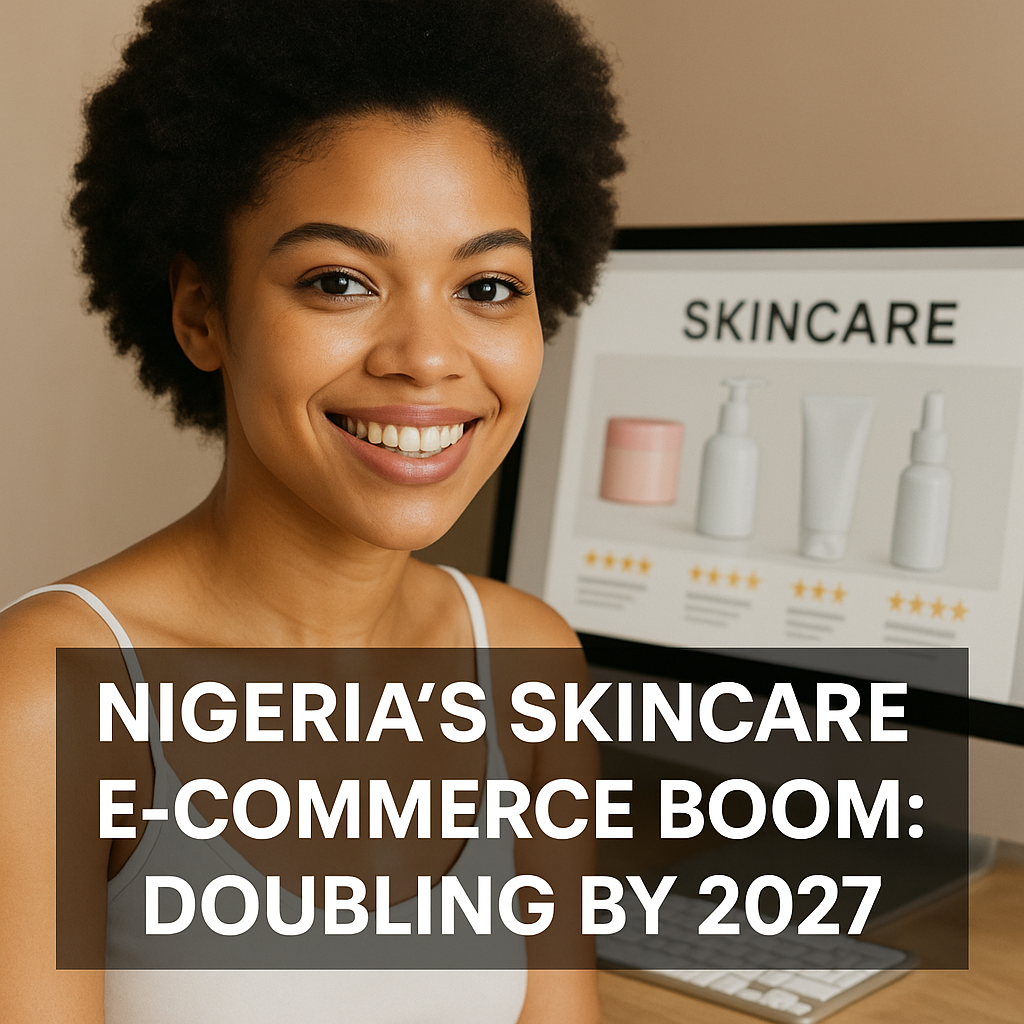
Nigeria’s Skincare E-Commerce Boom: Doubling by 2027
Nigeria’s Skincare E-Commerce Boom: Doubling by 2027
Nigeria’s Skincare E-Commerce Boom: Doubling by 2027, driven by rising beauty trends, digital adoption, and local demand. Explore growth opportunities for brands, investors, and SMEs.
Introduction: A Market on the Rise
Nigeria’s beauty and skincare industry is entering a golden era. According to recent projections, the skincare e-commerce market in Nigeria will nearly double by 2027, creating massive opportunities for entrepreneurs, investors, and global brands looking to tap into Africa’s largest consumer base. With over 220 million people—70% of them under 35—Nigeria’s digital-first youth are driving a surge in online beauty shopping.
Why Nigeria’s Skincare E-Commerce Boom: Doubling by 2027
Several factors are fueling this rapid growth:
-
Digital Penetration: Over 120 million internet users in Nigeria are shifting daily purchases—including skincare—to online platforms.
-
Rising Middle Class: Disposable incomes are growing, especially among young professionals in Lagos, Abuja, and Port Harcourt.
-
Global Beauty Trends: Social media platforms like TikTok and Instagram are inspiring Nigerian consumers to experiment with skincare routines.
-
Increased Awareness: More Nigerians are prioritizing skin health, sun protection, and anti-aging products.
-
E-Commerce Growth: Platforms like Jumia, Konga, OjotaChemicalMarket.com, and AblissCosmetics.com are reshaping beauty distribution.
Market Size: Doubling by 2027
The Nigerian skincare e-commerce market is currently valued at $1.5 billion (2024) and is projected to hit over $3 billion by 2027. This represents an annual growth rate of over 15%, outpacing many other consumer sectors.
-
Urban demand hubs: Lagos, Abuja, and Port Harcourt.
-
Rising secondary hubs: Ibadan, Benin, Enugu, and Kano.
-
Cross-border trade: Nigeria is also supplying skincare to nearby markets like Ghana, Benin, and Cameroon.
Key Product Segments Driving Growth
-
Whitening & Brightening Creams – Popular for even skin tone and glow.
-
Moisturizers & Hydration Lotions – Nivea, Vaseline, and CeraVe dominate.
-
Sun Protection (SPF) – Growing awareness of UV damage.
-
Anti-Aging & Vitamin C Serums – Trending among middle-class women.
-
Natural & Organic Skincare – Demand for aloe vera, shea butter, and turmeric-based products.
The Role of E-Commerce Platforms
-
AblissCosmetics.com – Nigeria’s go-to wholesale skincare hub serving distributors, salon owners, and retailers.
-
OjotaChemicalMarket.com – Connecting Africa’s chemical and skincare raw material suppliers.
-
Jumia & Konga – Offering cross-border logistics and online visibility for brands.
-
Instagram & TikTok Shops – Driving direct-to-consumer (D2C) skincare sales.
Investment Opportunities
Nigeria’s skincare e-commerce boom is not just about beauty—it’s a serious business opportunity:
-
Local SMEs: Can launch private-label skincare products.
-
Investors: Can back scalable distribution and logistics platforms.
-
Brands: International skincare companies can localize products for African skin types.
-
Tech & Fintech: Payment solutions, credit lines, and embedded financing will accelerate sales.
Challenges to Consider
While the growth outlook is promising, businesses must navigate:
-
Counterfeit skincare flooding the market.
-
Logistics and last-mile delivery challenges.
-
Price sensitivity among consumers.
-
Regulatory compliance for imports and product safety.
Future Outlook: Doubling by 2027
By 2027, Nigeria will be Africa’s largest skincare e-commerce market, surpassing South Africa and Kenya. Early movers—both local and international—stand to capture market dominance.
-
For distributors: Invest in warehousing and logistics hubs.
-
For retailers: Strengthen digital marketing strategies (SEO, TikTok ads, influencer campaigns).
-
For investors: Focus on scalable supply chains and localized product innovation.
Nigeria’s skincare e-commerce industry is set for an unprecedented boom, with the market expected to double by 2027. For entrepreneurs, SMEs, investors, and global brands, now is the time to position strategically. Whether through wholesale distribution, direct-to-consumer platforms, or localized skincare innovation, the opportunity is massive.
Explore Nigeria’s trusted wholesale skincare platforms: Abliss Cosmetics and Ojota Chemical Market.
Tags:
- Abliss Cosmetics
- Abuja skincare market
- anti-aging skincare Nigeria
- Benin skincare demand
- Benin skincare imports
- Cameroon skincare imports
- CeraVe Nigeria
- counterfeit skincare Nigeria
- Enugu skincare demand
- Ghana skincare imports
- Ibadan skincare demand
- Instagram skincare Nigeria.
- Jumia skincare Nigeria
- Kano skincare demand
- Konga skincare Nigeria
- Lagos skincare e-commerce
- natural skincare Nigeria
- Nigeria beauty industry
- Nigeria cosmetics market
- Nigeria cross-border skincare trade
- Nigeria skincare
- Nigeria skincare industry
- Nigerian e-commerce growth
- Nigerian skincare market
- Nigeria’s Skincare E-Commerce Boom: Doubling by 2027
- Nivea Nigeria
- Ojota Chemical Market
- online skincare shopping Nigeria
- organic skincare Nigeria
- Port Harcourt skincare e-commerce
- skincare digital marketing Nigeria
- skincare distributors Nigeria
- skincare e-commerce boom
- skincare e-commerce Nigeria
- skincare investors Nigeria
- skincare logistics Nigeria
- skincare market in Nigeria
- skincare products Nigeria
- skincare regulation Nigeria
- skincare SMEs Nigeria
- skincare startups Nigeria
- skincare wholesale Nigeria
- SPF Nigeria
- sun protection Nigeria
- TikTok skincare Nigeria
- Vaseline Nigeria
- vitamin C serum Nigeria
